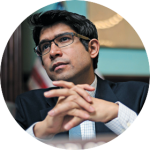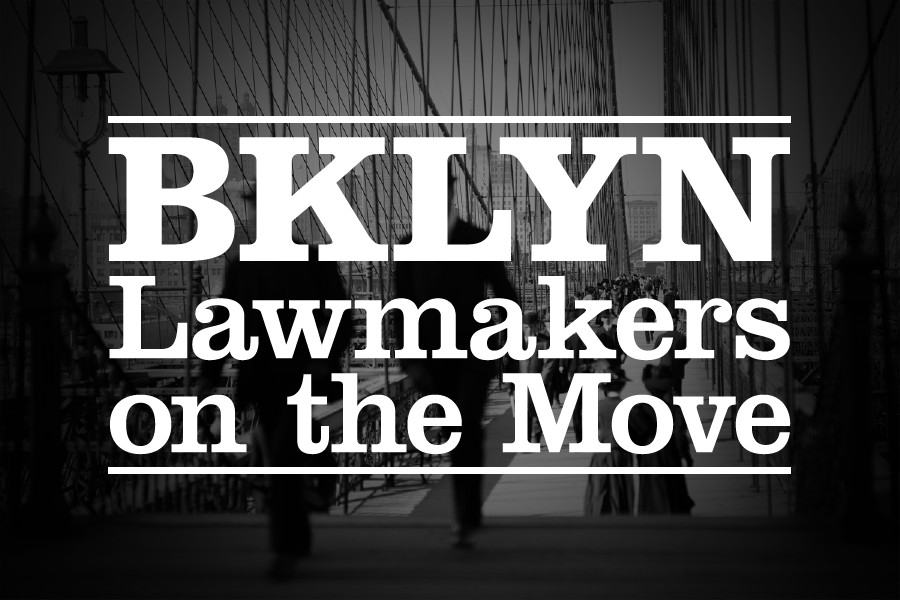Rose Pushes to Increase Funding for Substance Abuse and Opioid Treatment
U.S. Rep. Max Rose (D-South Brooklyn, Staten Island) led a bipartisan push for the “highest possible” funding for the Substance Abuse and Mental Health Services Administration (SAMHSA), the most important federal agency in fighting the opioid crisis, Congress is on track to increase funding by $140 million. The funding increase is part of the bipartisan funding bill which is expected to pass the House of Representatives today, the Senate later this week, and be signed into law by the President before government funding runs out at the end of the week.

“The opioid epidemic has caused incredible trauma and destruction in our communities, which is why the status quo is simply unacceptable,” said Rose, a member of the Bipartisan Heroin and Opioids Task Force. “That’s why I’ve been fighting non-stop to not only hold the Chinese pharmaceutical companies who are flooding our streets with fentanyl accountable but also making sure those on the front lines of prevention, treatment, and recovery efforts have the necessary tools and resources. Due to years of government dysfunction, we’ve seen static funding for far too long. I’m proud to see us break through the gridlock and pass substantive legislation and funding increases that will help save lives.”
SAMHSA plays a critical role in fighting the opioid epidemic through funding and grant programs to state and local governments, and other institutions to help ensure Americans receive the prevention, treatment, and recovery services they need. The legislation is expected to pass the House of Representatives, will fund SAMHSA at $5.9 billion, $140 million above the 2019 enacted level of funding, and $205 million above the President’s budget request. The SAMHSA funding includes $3.8 billion in funding for substance abuse treatment, which includes for opioid prevention, treatment and recovery, $19 million more than previous funding levels.
Cornegy Reflects on Pedestrian Struck & Killed By Building Façade
New York City Council Member Robert E. Cornegy Jr. (D-Bed-Stuy, Crown Heights), Chair of Housing and Buildings Committee, released the following statement following news reports of architect Erica Tishman being struck and killed by part of a building façade Tuesday morning in Manhattan.

“My condolences go out to the family and friends of Erica Tishman, who was struck and killed this morning, reportedly, by part of the façade of a building. All the relevant authorities, including the Department of Buildings, must thoroughly investigate. We must be sure Local Law 11, the Façade Inspection & Safety Program, and our broader policies result in safety.”
Cornegy continued, “Buildings safety is important for all New Yorkers and important for the millions who visit our City. Whether workers on buildings sites or pedestrians walking our streets, maintaining safety is a critical responsibility. As we keep this pedestrian and the family that experienced this terrible loss in our prayers, we must remain committed to heightening safety around buildings and ensuring that our City is safe for all.”
Ortiz, Simon, Menchaca Challenge Cuomo’s New Transit Police Force
A broad citywide coalition of progressive grassroots organizations, public transit riders, and elected officials convened outside MTA headquarters Tuesday evening to call on Governor Andrew M. Cuomo to change course and remove the 500 new MTA police officers from his transit agency’s budget vote Wednesday morning. Rallygoers sought to protect the transit funds that enable the MTA to run the subways, buses, and Access-a-Ride services that eight million New Yorkers depend on each day.

Assistant State Assembly Speaker Félix W. Ortiz (D-Sunset Park) said, “The MTA has a responsibility to its riders to invest all available funds back into the transit system, providing more frequent and reliable service for everyone. Working people and communities underserved by good public transit need a system that works for them. All New Yorkers deserve a transit system that prioritizes the people that use it.”
Since proposing the addition of 500 new MTA police officers to the NYPD’s 2,700 officer-strong Transit Bureau earlier this year, Governor Cuomo and aides have shifted from one justification to another. Initially announced as a crackdown on fare evasion, state officials have raised homelessness, felonies, misdemeanors and terrorism as possible rationales for spending $249 million more on police in four years. The MTA projects a budget deficit of $433 million over the same period.

“When transit crime is going down and ridership is going up, it is unconscionable to waste New Yorkers tax money on additional cops when what straphangers really need is more reliable, frequent service,” said Assemblymember Jo Anne Simon (D-Brooklyn Heights, Downtown Brooklyn, Cobble Hill, Carroll Gardens, Gowanus, Park Slope, Boerum Hill, DUMBO). “We owe it to the New Yorkers who use subways and buses every day to improve performance and provide reliable, accessible transit, and to stop criminalizing poverty. I stand with the Riders Alliance and my colleagues to call on Governor Cuomo to invest in subway and bus service and not focus our limited resources on over-policing.”
A recent Riders Alliance analysis found that for the same $249 million, the governor could direct the MTA to increase midday and weekend subway service by 15%. Fifteen percent more midday and weekend trains would save millions of riders valuable time every day. Trains that now come every six to ten minutes would instead arrive every

five to eight minutes. More frequent service would improve rider safety by cutting long waits in stations and crowding on trains. Alternatively, some of the savings could also be spent to improve bus and Access-A-Ride service as well.
“Our subways are crumbling, our bus system is atrociously unreliable, and many of our communities are still transit starved,” said NYC Council Member Carlos Menchaca (D-Sunset Park, Red Hook, Greenwood Heights, and portions of Borough Park, Dyker Heights, and Windsor Terrace). “Yet rather than tackle these foundational issues with more funding, the MTA wants to spend millions on police and ads disciplining New Yorkers to pay their fares instead. Memo to the MTA: the poor are not the problem here. It’s the system that needs a reality check. I join transit advocates and my fellow City, State, and Federal colleagues in calling on Governor Cuomo and the MTA to focus on the problems they can fix, not make other ones worse through this budget proposal.”
Myrie, Richardson Rename Subway Stops for Medger Evers College
New York State Senator Zellnor Myrie (D-Brownsville, Crown Heights, East Flatbush, Gowanus, Park Slope, Prospect Heights, Prospect Lefferts Gardens, South Slope, Sunset Park) and Assembly Member Diana Richardson (D-Crown Heights, Prospect Lefferts Gardens) sponsored a bill directing the MTA to rename certain subway stations. Senate Bill S3439A passed in both houses of the legislature on June 19th, 2019. Governor Cuomo signed the legislation Tuesday, which will rename two subway stations in honor of Medgar Evers College.

Myrie said, “Renaming these stations to recognize Medgar Evers College will literally put one of our community’s most cherished institutions on the map. This is an honor to the history of our community, the legacy of the civil rights leader Medgar Evers, and the school that bears his name. It will also help with wayfinding to support the continued growth and prosperity of the college.”
The legislation will direct the MTA to append the college’s name to both the Franklin Avenue and President Street stops, making their new names “Franklin Avenue – Medgar Evers College” and “President Street – Medgar Evers College.”
Richardson said, “I am thrilled for the name changes of the MTA’s Franklin and President Subway stops to recognize the great civil rights leader, Medgar Evers. As an alumnus of Medgar Evers College in Brooklyn, I am honored to have authored legislation and proud to have worked with the Crown Heights community to make this happen. Medgar Evers

College is a staple for our district and serves as a door of opportunity for our students. Its impact on our community is being celebrated and receiving the recognition that it deserves.”
Medgar Evers was a civil rights leader known for his contributions to ending desegregation and expanding voting rights. By serving primarily students of color, Medgar Evers College carries on the legacy of an inspirational advocate who gave his life fighting for the rights of African Americans. Renaming the subway stops surrounding the college will not only help with wayfinding for the thousands of current and prospective students headed to MEC, but will also serve as an honor to the Central Brooklyn community that cherishes it.
Schumer, Gillibrand Announce $665 Million for NYC Anti-Terrorism Funding
U.S. Senate Minority Leader Charles E. Schumer (D-NY) and U.S. Senator Kirsten Gillibrand (D-NY) announced Tuesday that the New York City area is set to receive a lion’s share of a $665 million dollar pot of federal Urban Area Security

Initiative (UASI) funds, an agreement reached as part of the larger budget deal needed to pass by the end of this month. The UASI program provides funding to address the unique needs of high-threat, high-density urban areas by helping to prevent, protect against, mitigate, respond to, and recover from acts of terrorism. The $665 million represents an increase of 56% from the President’s request earlier in the year of $426 million.
“Everyone knows New York remains a number one terror target and a place where evil-doers look to exploit weak links,” said Schumer “Federal security funds, like UASI, are the cornerstone of effective preparedness and prevention against terror threats and enable the NYPD to do all they can to keep New Yorkers safe and secure. These dollars prevent costly and crippling disasters, but more importantly, these dollars save lives and so, it is good news that as part of the federal budget deal we were able to secure both an increase in anti-terror funds to New York as compared to the President’s budget, and an increase over last year, too.”
The UASI program provides funding to address the unique needs of high-threat, high-density urban areas like the New York

metropolitan area. Schumer said that these funds help keep us one step ahead of the terrorists and New York City needs all the UASI funds it can get to help make sure we are kept safe.
“It is a tragedy that New York and places across the country still face the threat of terrorism and violence. No one should ever have to live in fear of being the target of a terror attack,” said Gillibrand. “These critical funds will also provide nonprofits and places of worship that are at risk of being targeted with the resources they need to enhance their security and help prevent attacks. I will always do everything I can to help keep New Yorkers safe.”










